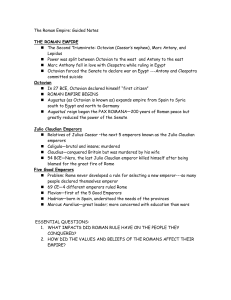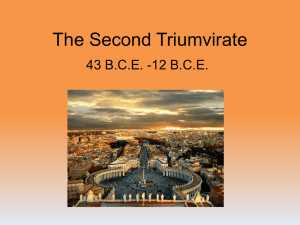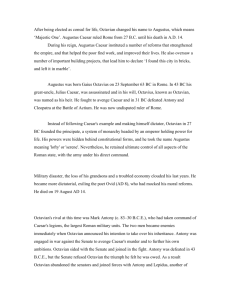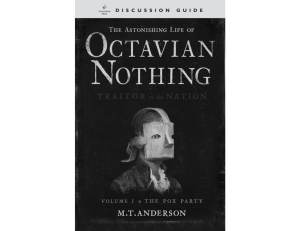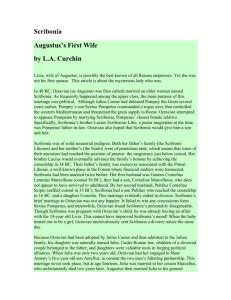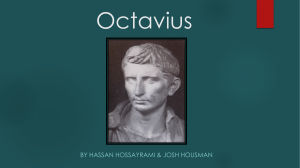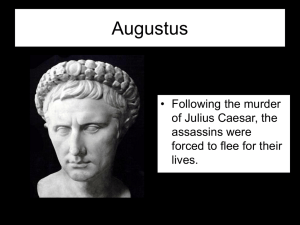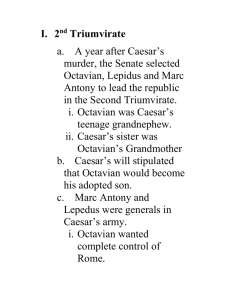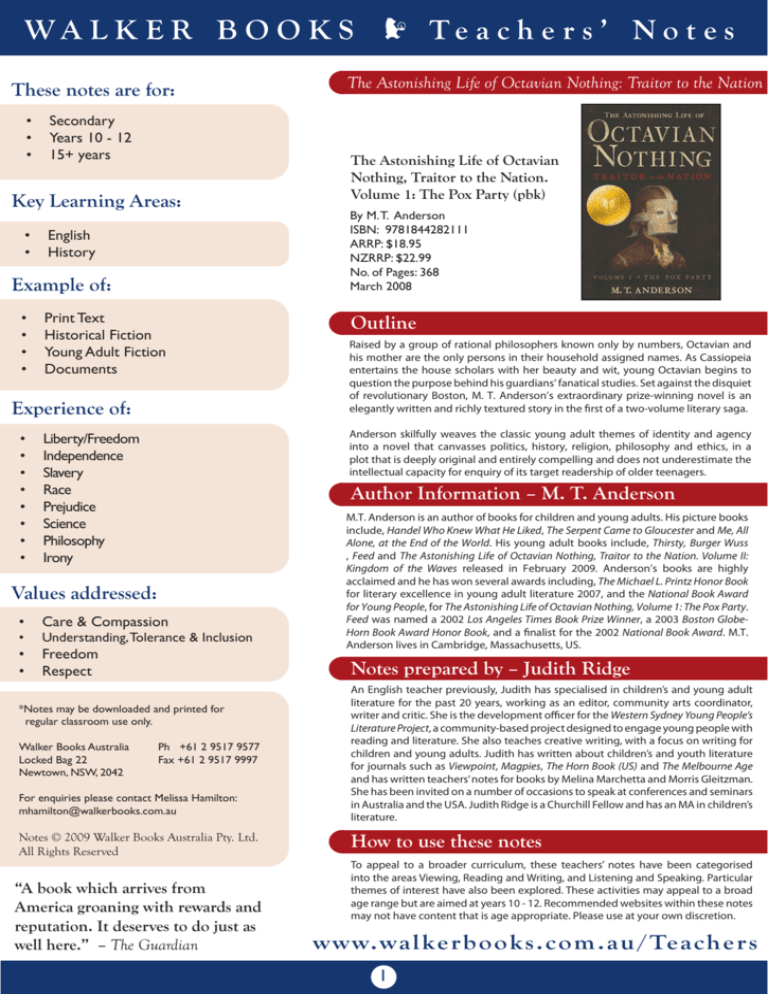
WA L K E R B O O K S E Te a c h e r s ’ N o t e s
These notes are for:
• Secondary
• Years 10 - 12
• 15+ years
Key Learning Areas:
• English
• History
Example of:
•
•
•
•
Print Text
Historical Fiction
Young Adult Fiction
Documents
Experience of:
•
•
•
•
•
•
•
•
By M. T. Anderson
ISBN: 9781844282111
ARRP: $18.95
NZRRP: $22.99
No. of Pages: 368
March 2008
Outline
Raised by a group of rational philosophers known only by numbers, Octavian and
his mother are the only persons in their household assigned names. As Cassiopeia
entertains the house scholars with her beauty and wit, young Octavian begins to
question the purpose behind his guardians’ fanatical studies. Set against the disquiet
of revolutionary Boston, M. T. Anderson’s extraordinary prize-winning novel is an
elegantly written and richly textured story in the first of a two-volume literary saga.
Author Information – M. T. Anderson
• Care & Compassion
Understanding, Tolerance & Inclusion
• Freedom
• Respect
M.T. Anderson is an author of books for children and young adults. His picture books
include, Handel Who Knew What He Liked, The Serpent Came to Gloucester and Me, All
Alone, at the End of the World. His young adult books include, Thirsty, Burger Wuss
, Feed and The Astonishing Life of Octavian Nothing, Traitor to the Nation. Volume II:
Kingdom of the Waves released in February 2009. Anderson’s books are highly
acclaimed and he has won several awards including, The Michael L. Printz Honor Book
for literary excellence in young adult literature 2007, and the National Book Award
for Young People, for The Astonishing Life of Octavian Nothing, Volume 1: The Pox Party.
Feed was named a 2002 Los Angeles Times Book Prize Winner, a 2003 Boston GlobeHorn Book Award Honor Book, and a finalist for the 2002 National Book Award. M.T.
Anderson lives in Cambridge, Massachusetts, US.
Notes prepared by – Judith Ridge
*Notes may be downloaded and printed for
regular classroom use only.
Walker Books Australia
Locked Bag 22
Newtown, NSW, 2042
The Astonishing Life of Octavian
Nothing, Traitor to the Nation.
Volume 1: The Pox Party (pbk)
Anderson skilfully weaves the classic young adult themes of identity and agency
into a novel that canvasses politics, history, religion, philosophy and ethics, in a
plot that is deeply original and entirely compelling and does not underestimate the
intellectual capacity for enquiry of its target readership of older teenagers.
Liberty/Freedom
Independence
Slavery
Race
Prejudice
Science
Philosophy
Irony
Values addressed:
•
The Astonishing Life of Octavian Nothing: Traitor to the Nation
Ph +61 2 9517 9577
Fax +61 2 9517 9997
For enquiries please contact Melissa Hamilton:
mhamilton@walkerbooks.com.au
Notes © 2009 Walker Books Australia Pty. Ltd.
All Rights Reserved
“A book which arrives from
America groaning with rewards and
reputation. It deserves to do just as
well here.” – The Guardian
An English teacher previously, Judith has specialised in children’s and young adult
literature for the past 20 years, working as an editor, community arts coordinator,
writer and critic. She is the development officer for the Western Sydney Young People’s
Literature Project, a community-based project designed to engage young people with
reading and literature. She also teaches creative writing, with a focus on writing for
children and young adults. Judith has written about children’s and youth literature
for journals such as Viewpoint, Magpies, The Horn Book (US) and The Melbourne Age
and has written teachers’ notes for books by Melina Marchetta and Morris Gleitzman.
She has been invited on a number of occasions to speak at conferences and seminars
in Australia and the USA. Judith Ridge is a Churchill Fellow and has an MA in children’s
literature.
How to use these notes
To appeal to a broader curriculum, these teachers’ notes have been categorised
into the areas Viewing, Reading and Writing, and Listening and Speaking. Particular
themes of interest have also been explored. These activities may appeal to a broad
age range but are aimed at years 10 - 12. Recommended websites within these notes
may not have content that is age appropriate. Please use at your own discretion.
w w w. wa l ke r b o o k s . c o m . a u / Te a ch e r s
1
WA L K E R B O O K S E Te a c h e r s ’ N o t e s
Before Reading the Text
Octavian Nothing is set in Boston and other parts of Massachusetts in the years leading up to the American Revolutionary War. Some historical
context for the novel, including reasons for the revolution and the history of slavery in the northern colonies of pre-revolutionary America may
help your students to ease their way into the world of the novel. It may also prove useful for students to research the educational and philosophical
movements of the day, especially Jean-Jacques Rousseau and the Age of Enlightenment.
Carry out research: What were the primary reasons for the American Revolutionary War? Note the resonance of the themes of liberty and
independence set against the differing attitudes towards slavery – both are central to the novel’s thematic concerns.
The following website might be useful for researching the historical context for this novel. Please use these websites at your discretion.
digitalhistory.uh.edu
www.digitalhistory.uh.edu/historyonline/chron18.cfm
Historian Douglas Harper’s website “Slavery in the North”
www.slavenorth.com
historyplace.com
www.historyplace.com/unitedstates/revolution/index.html
The novel opens with a quote from Rousseau’s Emile, or On Education.
Rousseau’s theories of “natural education” and the corrupting nature of
society are explained at the following site:
theamericanrevolution.org
www.theamericanrevolution.org/tline.asp
www.infed.org/thinkers/et-rous.htm
The Massachusetts Historical Society
www.masshist.org/revolution
Viewing
•
•
•
The cover of the novel features a striking image. Discuss the cover
(including the choice of typeface). What do they suggest the
book might be about? What do students learn or assume about
the main character from the cover image? What thematic aspects
of Octavian’s story is the cover image representative of? In your
library look at other covers of historical fiction (there are some
recommendations at the end of these notes). Do covers often
portray the period the book is set in?
Octavian Nothing is presented to the reader as a set of historical
documents “collected” by “Mr M.T. Anderson of Boston”. What
effect does this conceit have on your students’ reading of the
book? Read other books with a similar conceit (e.g. Strange
Objects by Gary Crew).
•
Select an event from the book and create a “historical” document
about it; e.g. a notice about the escaped slave Pro Bono; a
death announcement for one of the victims of the Pox Party;
a newspaper report about the events in the battle described
by Evidence Goring (pp270-278). Students should pay careful
attention to both language and graphic presentation.
•
Discuss Dr Trefusis’s “09-01” assertion (one of numerous examples
of irony in the text) that “colour resides in the eye of the beholder”
(p70). Is this true? What does this statement reveal about Dr
Trefusis? How else is colour used to explore the novel’s interest in
questions of race, justice, power and privilege?
•
Explore the use of imagery in Octavian Nothing (especially light,
dark and fire). How does the novel use these images to explore
its thematic concerns? (including race, power, privilege, justice,
the rational versus the humane, the intellectual life versus the
physical and emotional, liberty/freedom and identity). Create a
table with these different types of imagery and how they relate to
the themes. For example Table 1 on p5 of these notes.
•
How does the use of imagery highlight the text’s central irony;
the position of slaves in a society hell-bent on achieving liberty
from its own oppressor? Ask the students to represent this
particular irony in graphic form: a political poster, a cartoon, a
piece of propaganda etc. Contemporary or period visual style and
language can be addressed in this activity.
Use the primary sources found in student research “Before
Reading the Text” as a comparison to the faux historical
documents used throughout Octavian Nothing. Discuss the
following questions:
How accurate/believable are the fictional versions of these
documents?
What function do they play in the novel in terms of creating
a sense of authenticity?
What other narrative functions do these documents have in
telling the story of Octavian Nothing?
•
Discuss: What other conventions, including graphic conventions,
does the text use to portray a convincing 18th century milieu?
(Note that the text uses a variety of narrative devices, multiple
narrative voices and stylistic features).
2
WA L K E R B O O K S E Te a c h e r s ’ N o t e s
Reading & Writing
•
•
In the College of Lucidity, the names of the “academicians” have
been replaced by numbers, however Octavian and his mother
Cassiopeia and the slave Pro Bono have names given to them.
Research and report on the significance and meaning of names
and their relationship to the book’s themes of identity and
freedom. (e.g. Cassiopeia means “she whose words excel” – who
was Cassiopeia in Greek mythology? Include the real names of the
College men, Mr Sharpe, Evidence Goring and his family, etc.)
Discuss whether any of the multiple voices, particular in the
second half of the book were more or less convincing than
others? How do these multiple voices contribute to the making of
meaning in the text?
•
Consider the placement of different “documents” in the text; e.g.
the extract from the ‘The Boston Gazette’ (p41); the scientific chart
(p45). What effect does the juxtaposition of these alternative
narrative texts against the main story have for the reader? Discuss.
•
Sections of the text have been scribbled out. When do these
sections occur and why might Octavian have scribbled them out?
Have your students rewrite the text that Octavian has scribbled
out, taking into account his narrative “voice” and his state of mind
at the time of writing those passages.
•
•
Read and contrast the reports of Cassiopeia’s death by Octavian,
Mr Gitney/Mr Sharpe and Dr Trefusis.
•
Cassiopeia’s story is depicted by the young Octavian as a fairytale
(pp30-31); the College is described as a fairytale castle (p125)
(another example of irony in the text) and Cassiopeia wishes to
hear a fairytale on her sick bed (p211). What aspects of the story
fit this “fairytale” mould? Rewrite Cassiopeia’s story as a fairytale,
using the language and style of traditional fairytales of the period
(e.g. Brothers Grimm or Perrault).
•
Discuss the role of art and literature, history and philosophy
in Octavian’s upbringing and his “downfall”. Note how these
studies are deemed to be signs of idleness and privilege
under Mr Sharpe’s regime (pp127-131) at the College and his
statement about Octavian’s people being a “story-telling people”:
“Narrative, Sir, is precisely what we wish to wean him from” (p130).
Have students write a speech or piece of persuasive writing
to convince their audience of the benefits or drawbacks of a
classical education. They may wish to take on a persona (such as
a rationalist like Mr Sharpe) or write from their own point of view.
Have them decide who their audience is before beginning.
•
On infecting Octavian with the small pox infection, Mr Gitney
proclaims “Through corruption you shall be healed” (p191).
Discuss what are aphorisms and their ironic use in literature and
history (e.g. the slogan over the gates of Auschwitz: Arbeit Macht
Frei – Work Shall Make You Free). Have the students write their
own aphorisms, either drawing on events from the novel or from
their own lives.
•
Discuss some of Anderson’s narrative choices as they pertain to
the character of Octavian, e.g. Octavian is apparently narrating the
story from a position of advantage in the future (p3 “I was raised…
I recall… I did not yet understand”, yet at times his narration
brings him so close to the events described (his mother’s death)
that language fails him as if the event had only just occurred.
Some parts of the story, particularly in the last two sections of
the novel, are not related by Octavian at all, but by a number of
other characters. Why did Anderson make these choices? Are they
effective? How might the story be different if it had all been from
Octavian’s point of view?
•
Discuss the concept of the reliable narrator. Is Octavian reliable
(i.e. can we trust the version of events he presents us?) How do we
know? Is there a difference between ignorance/misinformation
and unreliability? (Note the exchange between Dr Trefusis and
Octavian as they watch Cassiopeia dancing, p200.)
•
Consider the sections of narration given over to other characters
(through letters, diary entries etc). Are these sections reliable or
not? What information and clues does Anderson provide for the
reader to assess the reliability of these alternate voices?
•
Look at the techniques Anderson uses to provide the reader with
information about Octavian that he does not or cannot provide
himself. (These come particularly in Part III of the book starting
on p235, including Private Evidence Goring’s letters home and
other alternative narrative voices.) Encourage your students to use
similar techniques in their own narrative writing.
A sense of irony pervades the text; irony is a difficult concept for
many students to grasp. Find and discuss examples of irony in the
novel:
“one could not observe nothing” (p9) ( i.e. irony centring on
Octavian’s name and the futility of the experiments conducted by
the academicians).
“Parliament would reduce honest men of business to the status of
slaves.” (p44)
Cassiopeia’s refusal to prostitute herself to the English nobleman,
which would have ultimately secured her and Octavian’s freedom
(pp161-162).
“feared that slaves, enflamed with overheard talk of liberty, would
assume such freedom applied to them” (p221).
Discuss how these examples reflect on the novel’s larger themes.
Have students write their own narrative story exploring the theme
and device of irony.
•
•
Silence and silencing is a powerful metaphor throughout
the book. Find and list examples throughout the book where
language is of importance to Octavian and others then find
examples of times when language fails Octavian. (There are
different types of “silence” in the novel e.g. Octavian’s “Observant”
states; his inability to write the worst of his mother’s death; his
selective muteness after his escape; the mask that is placed over
his head.
Note the quote, “They gave me a tongue; and then stopped it up,
so they would not have to hear it crying.” (p309). How does this
use of language and silence reflect on the novel’s larger themes of
freedom and identity? Discuss.
3
WA L K E R B O O K S E Te a c h e r s ’ N o t e s
Listening & Speaking
•
Octavian Nothing has been criticised as being too difficult for
its target audience of older teenagers. Author M.T. Anderson
disagrees, arguing that, “Teens like challenges” (see the link to the
Washington Post article in the Websites section of these notes). Set
up a round table discussion of the novel, focused on its interest
to and accessibility for a teenage readership. The panel should
include a moderator and people with different opinions of the
book. For an example of this style of discussion view The First
Tuesday Bookclub at http://www.abc.net.au/tv/firsttuesday
•
Section 4 of the novel opens with the quote from Voltaire, “In this
world we are condemned to be an anvil or a hammer”. Students
prepare and give a speech in which they agree or disagree with
Voltaire’s statement.
•
In small groups or pairs, students dramatise a scene from the
book. Suitable examples include: the exchange between Octavian
and Pro Bono where Octavian discovers he is a slave (pp38-40);
the exchange between Octavian and his dying mother about their
homeland (pp218-219); the scene at the farm in Acton (p238).
•
Read the exchange between Pro Bono and Octavian (p38-40).
Discuss the topic, is ignorance freedom?
•
Students choose one of the classical scholars, philosophers or
writers Octavian studies at the College. Research this person and
present their findings to the class, using some form of media
presentation as well as their own oral presentation.
•
Set up a debate between a team representing the Rationalists and
those who objected to the experimental treatment of Octavian
and others. Present the arguments for and against this treatment
using the language of the period where possible, and the
arguments put forward by characters in the novel.
Australian Connections
•
Have your students research the 1769 Transit of Venus and
its place in Australian history. What role did the American
Revolutionary War play in the establishment of the colony in New
South Wales? Discuss.
•
Ask your students to consider the commonalities between the
impact of colonisation/invasion on Aboriginal Australians and the
references in Octavian Nothing to Native Americans. (See pages
22-23, p25, pp53-57, p63, p101; the play about the Incan princess.)
•
Students research the impact of imported diseases, such as
smallpox on Aboriginal Australians.
•
Look at online samples from Dawn, a magazine for Aboriginal
Australians published from 1952 to 1975. What attitudes towards
Aboriginal Australians are revealed in the magazine?
•
The experiment conducted on Octavian by the academicians of
the College of Lucidity to prove, or disprove, African intelligence
is echoed by some arguments in early colonial and 20th century
Australia about Aboriginal Australians, as displayed in the
document at the following link:
nla.gov.au/nla.aus-f2047
This undated pamphlet in defence of the intelligence of
Aboriginal Australians is well-intentioned, but nevertheless
reveals some unfortunate stereotypes and outdated attitudes.
Encourage your students to read and discuss its contents
critically, and compare it to the attitudes towards Octavian and
the experiment displayed by different characters in particular Dr
Trefusis.
www.aiatsis.gov.au/aboriginal_studies_press/find_a_book/
reference/dawn_and_new_dawn
Belonging
•
•
The Astonishing Life of Octavian Nothing, Traitor to the
Nation: Volume 1 The Pox Party may be effectively used as a
supplementary text in the area of study, “Belonging”, for the
NSW HSC English curriculum (for more information visit the
following link http://community.boredofstudies.org/818/conceptbelonging/186384/area-study-belonging.html)
•
How relevant is the question of race to the theme of belonging?
Read the following extract from p314 and discuss this question:
They told me of substance and form; they told me of matter,
of its consistency as a fluxion of minute, swarming atomies,
as Democritus had writ; they told me of shape and essence;
they told me of the motion of light, that it was the constant
expenditure of particles flying off the surface of things; they told
me of color, that it was an illusion of the eye, and event in the
perceiver’s mind, not in the object; they told me that colour had
no reality; indeed, they told me that color did not inhere in a
physical body any more than pain was in a needle.
And then they imprisoned me in darkness; and though there
was no color there, I was still black, and they were still white;
and for that, they bound and gagged me.
In small groups, and drawing examples from the text, brainstorm
how Octavian Nothing explores the concept of “belonging”:
Through the characters of Octavian and his mother, Pro
Bono, the members of the College (especially Dr Trefusis)
and other characters.
Through the historical setting of the lead-up to the
revolutionary war.
•
Through themes of colonialism as they pertain to Native
Americans. (see pages 22-23, p25, pp53-57, p63)
4
How does the use of different modes of text in Octavian Nothing
support the theme of Belonging?
WA L K E R B O O K S E Te a c h e r s ’ N o t e s
Contemporary Resonances
•
The classic theme of young adult (YA) literature is often the
central character’s journey towards identity and agency (an ability
to think and act self-reflectively in and on society). Despite its
historical setting and archaic language, Octavian Nothing explores
these themes through the journey of the protagonist Octavian.
•
Ask your students to select a young adult novel of their choosing,
and compare the internal journeys of the protagonist in each
novel. How is Octavian similar to a contemporary YA teenage
protagonist, and how is he different? Students may like to
represent this comparative study in chart or diagram form; they
should focus on thematic similarities between the characters,
their concerns, needs, desires and emotions, rather than obvious
historical differences.
•
•
Read Dr Trefusis’s observations about young people during the
Pox Party (p203). This passage can be read as a direct reference
to Anderson’s earlier YA novel Feed. What is Dr Trefusis saying
about young people in this passage? What does the novel Feed
say about Dr Trefusis’s observation, “The young must have their
entertainments”? Make a comparative study of youth and society
as represented in Octavian Nothing and Feed.
•
After research, discuss Octavian Nothing as a case study of posttraumatic stress disorder. Listed below are some websites useful
for researching this topic.
Much of the language in the novel is a representation of different
modes of language from the 18th century, however, one passage
in particular has a very contemporary feel: The diary extract (p238)
employs phonetic spelling and abbreviated words that resemble
modern text message and email language. Have a class discussion
or formal debate on the topic, “That modern technology is
destroying the English language”.
http://www.anxietyaustralia.com.au/anxiety_disorders/post_
traumatic.shtml
http://www.reachout.com.au/default.asp?ti=2237
@
Websites (other than those included in the text)
Reviews of Octavian Nothing Volume 1:
http://www.nytimes.com/2006/11/12/books/review/Davidson.t.html
http://www.guardian.co.uk/books/2007/jan/20/featuresreviews.guardianreview29
Interview with MT Anderson:
http://www.washingtonpost.com/wp-dyn/content/article/2008/11/28/AR2008112802766.html
Octavian Nothing and the Gothic genre:
http://www.schoollibraryjournal.com/article/CA6600683.html?industryid=47074
Table 1
Race
THEME
Power
IMAGERY
Light
Dark
Fire
etc ...
5
Freedom
etc ...
WA L K E R B O O K S E Te a c h e r s ’ N o t e s
Ideas for the Library/Related Texts
Historical Relevance
Find books in the library to display and read that relate historically to
Octavian Nothing. For example:
Other Historical Fiction titles from Walker Books
Below are some suggestions of other young adult fiction titles that
focus on particular periods of history:
Wanting by Richard Flanagan
Young Nick’s Head (Stowaway: US edition) by Karen Hesse
Captain Cook’s Apprentice by Anthony Hill
To Be a Slave by Julius Lester
Apache by Tanya Landman (19thC, Native American)
Highwayman’s Footsteps by Nicola Morgan (18thC, Scotland)
Ratwhiskers and Me by Lorraine Marwood (19thC, Vic-Australia)
Bloodline by Katy Moran (Dark Ages)
Daughter of Venice by Donna Jo Napoli (16thC, Venice-Italy)
Cassandra’s Sister by Veronica Bennett (19thC, Jane Austen portrayal)
For more information on these titles visit:
Shared Themes and Narrative Styles
Find books in the library to display and read that have similar themes
and narrative style to Octavian Nothing. For example:
www.walkerbooks.com.au/Books
Feed by MT Anderson
Hang a Thousand Trees with Ribbons by Ann Rinaldi (18thC historical
fiction based on the story of the first African American female poet,
Phillis Wheatley)
Jonathan’s Swift’s Gulliver retold by Martin Jenkins (Academy of Lagado,
p93 onwards, as a model for the College of Lucidity)
Hamlet by William Shakespeare (play within a play: reveals greater
themes. See pp101 of Octavian Nothing)
Other YA fiction from M.T. Anderson
Available now! Volume II in The
Astonishing Life of Octavian Nothing.
Title
The Astonishing Life of Octavian
Nothing, Traitor to the Nation. Volume
II: The Kingdom of the Waves
ISBN
9780763629502
Price
Arrp $29.95/NZrrp $34.99
Title Burger Wuss
ISBN 9781844282890
Price Arrp $16.95/NZrrp$19.99
Anthony is a wuss. He has never been able to
stand up for himself. That is, until the day he
finds his girlfriend, Diana, in someone else’s
arms! Then Anthony vows revenge and devises
The Plan. A deliciously piquant dish of burgers,
bullies and revenge!
Title Feed
ISBN 9780763622596
Price Arrp $16.95/NZrrp$19.99
Published
February 2009
A satirical novel set in an imagined future
when the internet and advertising banners
are fed directly into people’s heads via a
computer chip. Besides being a smart, savage
satire, Feed is also a poignant story about
human connection and loss that leaves an
unforgettable emotional impact.
In the second volume of The Astonishing Life of Octavian Nothing,
Octavian and Doctor Trefusis escape to Virginia where Octavian
joins up with Lord Dunmore’s troops, following the famous
proclamation promising to liberate any slave that will fight
for the British in the Revolutionary war. While there, Octavian
reunites with Bono, fights in vicious battles, and falls desperately
in love. Elegantly written and richly textured, this is a startling
and stimulating novel for young adult readers.
Title Thirsty
ISBN 9780763638955
Price Arrp $16.95/NZrrp$19.99
Chris just wants to be a normal guy – to hang
out with his friends, avoid his bickering parents
and get a date with Rebecca Schwartz. Lately,
though, he’s been feeling anything but normal.
He has this strange desire, a terrible hunger, a
thirst for blood. The truth is unavoidable; Chris
is turning into a vampire.
“The book is dense, complex and intricate. But those willing to make the
effort will definitely be rewarded.” – Centre for Youth Literature
6

